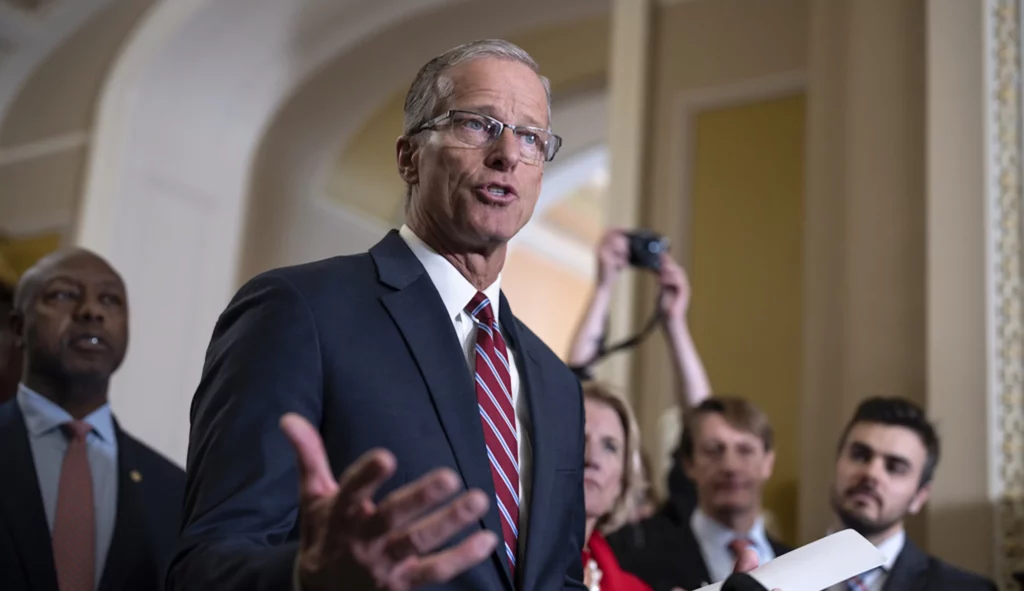
Congressional Republicans are at odds over how to pass President-elect Donald Trump’s agenda, with a spat over taxes consuming the final weeks before he takes office.
Congress is weighing competing priorities as Republicans prepare to assume unified control of Washington in January. Incoming Senate Majority Leader John Thune (R-SD) wants a quick win on energy and the border, announcing a plan on Tuesday that would pair the legislation with a larger defense bill.
MEET THE NEW CONGRESS: THE HOUSE AND SENATE FRESHMEN ELECTED TO SERVE NEXT YEAR
But the proposal has been met with a cool reception in the House. Thune plans to punt a deal on tax reform until later in the year, prompting concern from members of the Ways and Means Committee who fear their bill will get sidelined.
The timing matters because Republicans could only have two opportunities to pass their agenda without Democratic support. Each year, they can use a tool called reconciliation to circumvent the filibuster and approve their spending priorities with 51 Senate votes.
In theory, Republicans could tackle taxes in October, once the new fiscal year begins, but House tax writers believe the strategy is an unnecessary risk. The tax cuts Trump signed in 2017 expire at the end of 2025.
Instead, those lawmakers, led by Rep. Jason Smith (R-MO), the chairman of the House Ways and Means Committee, want to see border security and energy reform rolled into a single, larger tax package.
“House Republicans are unified that we’ve got to deal with border, energy, and taxes. I think reasonable people are trying to figure out, tactically, what’s the right way to deliver that,” said one House GOP lawmaker familiar with the discussions.
“Frankly, it all comes down to this central question: Is it better to have a narrow package that puts points on the board right away? Or is it better to spend a few more months putting together a comprehensive package?” the lawmaker added.

The conflict is an early sign of the difficulty Republicans will have in staying united next year. Not only is there a short window to get Trump’s agenda passed, but Republicans have almost no room for error if they want to go it alone.
They will start the year with a zero-seat majority in the House, virtually the same margin that doomed past attempts to pass a budget without Democratic support. In the Senate, Republicans have a three-seat cushion.
Thune’s plan, announced at a Senate GOP policy retreat, has the advantage of delivering Trump a policy win on one of the defining issues of the presidential race: the border.
Republicans likely can’t use reconciliation, a budgetary procedure, to make sweeping policy changes. Only provisions that have a direct impact on the deficit will be permitted by the Senate parliamentarian. But they can authorize additional money for the border wall, or to hire additional agents.
House tax writers, for their part, are worried their package will lose votes if it does not include deal-sweeteners on the border or energy reform. Restoring the state and local tax deduction, in particular, will be a point of contention for Republicans in higher-income states.
TRUMP CABINET PICKS: WHO’S BEEN TAPPED TO SERVE IN THE PRESIDENT-ELECT’S ADMINISTRATION
Speaker Mike Johnson (R-LA) has not yet taken a position on how to proceed, telling reporters on Tuesday there are “pros and cons” to both approaches.
In the Senate, Thune is still building support for his proposal, with members expressing diverging views at Tuesday’s retreat.
“I don’t think there was any consensus on what the sequencing should be,” said Sen. John Cornyn (R-TX), a senior member of the Finance Committee.
“There’s going to have to be a whole lot more consultation and socializing the issues,” he added.
Sen. Steve Daines (R-MT), another Finance member, called the meeting an early opportunity to “digest what’s in front of us and to find the smartest path forward.”

Thune’s desire to split up the bills reflects the difficulty of getting a tax deal done. The House GOP lawmaker, speaking on condition of anonymity, predicted it could not pass before April.
Republicans are in agreement about extending the expiring provisions passed in 2017, but Trump promised a hodge-podge of new tax breaks on the campaign trail, some of which will face GOP resistance.
In addition to the SALT deduction, Trump has proposed exempting taxes on tips, Social Security, and overtime pay.
“We need to see if we can find room to fit them into whatever package we do,” said Sen. Mike Crapo (R-ID), the incoming chairman of the Finance Committee. “There will be some we agree with, and some we don’t.”
Unlike Smith, Crapo has declined to take a stance on the timing of reconciliation, leaving the matter to congressional leadership and Trump.
Should Thune move forward with his plan, Republicans hope to pass the bill within 30 days of Trump taking office.
They also want the first shot at reconciliation to be revenue-neutral. Senate Republicans are looking at ways to claw back uncommitted funds from the Inflation Reduction Act and coronavirus-era legislation.
“We’re talking about actually paying down more than what things cost,” said Sen. Ron Johnson (R-WI), a fiscal conservative and Finance Committee member.
Republicans successfully passed the Tax Cuts and Jobs Act, the expiring piece of legislation, in the first year of Trump’s first term using budget reconciliation.
But an earlier attempt at reconciliation failed in spectacular fashion. After months of trying to repeal Obamacare, the late Sen. John McCain cast the deciding vote that blocked a so-called “skinny repeal” from becoming law.
CLICK HERE TO READ MORE FROM THE WASHINGTON EXAMINER
Using reconciliation gets slightly easier in the second half of next year for Republicans. Trump is plucking several House lawmakers to serve in his administration, creating vacancies that will be filled in April or beyond.
They will have a 220-215 majority once all seats are filled.




